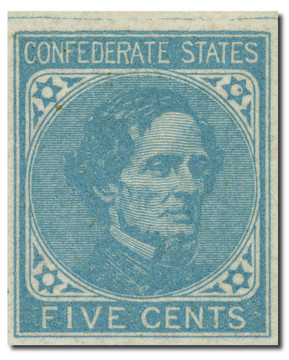
First Confederate Stamp
1861 5¢ Jefferson Davis
Own the first stamp issued by the Confederate States of America – and the only stamp to feature a living President! Confederate President Jefferson Davis posed for a special photograph used to create CSA1 – marking the importance of the South’s first postage stamp. CSA1 was engraved by Charles Ludwig, who used freehand drawing so each side of the stamp is unique, adding appeal for you as a collector.
Although they were inexperienced with stamp production and ill-equipped, Hoyer & Ludwig of Richmond, Virginia were chosen to print the first Confederate stamps. During the time it held the contract, Hoyer & Ludwig produced the first five Confederate stamps using three different designs – CSA #1-5. A hand-press was used to print the stamps using a process known as lithography.
A lithographic stone was placed on the bed of the printer, moistened with water, inked, and covered with paper. The stone was then run through the press and past a blade, which pressed the stamp images onto the paper. August Dietz, who is considered the “Father of Confederate Philately,” wrote that this process was time consuming. According to Dietz, only 200-480 sheets of stamps could be printed each day.
Did you know Mystic now owns the only surviving printing press used to produce the first Confederate postage stamps?
It’s true – and we love having this direct connection to the Civil War displayed in our headquarters.
Hoyer & Ludwig went out of business at the end of the Civil War, selling out to Simons & Keiningham, who later sold its equipment to A. Hoen & Company. (Hoen had introduced lithography in the U.S.) After a fire destroyed their headquarters, Hudson P. Hoen gave the old No. 3 press to Dietz.
No. 3 remained in his family long after August’s 1963 death and was displayed at the Dietz Printing Company for several years. It was also loaned to the Smithsonian Museum of American History, VAPEX 1975 and the APS StampShow in Richmond.
More than a century after Dietz acquired No. 3, his heirs offered the press at auction. Mystic President Don Sundman purchased the 1,000-pound cast iron press along with four lithographic stones made by Dietz. It now holds a place of honor at Mystic Stamp Company’s Camden, New York, headquarters.
First Confederate Stamp
1861 5¢ Jefferson Davis
Own the first stamp issued by the Confederate States of America – and the only stamp to feature a living President! Confederate President Jefferson Davis posed for a special photograph used to create CSA1 – marking the importance of the South’s first postage stamp. CSA1 was engraved by Charles Ludwig, who used freehand drawing so each side of the stamp is unique, adding appeal for you as a collector.
Although they were inexperienced with stamp production and ill-equipped, Hoyer & Ludwig of Richmond, Virginia were chosen to print the first Confederate stamps. During the time it held the contract, Hoyer & Ludwig produced the first five Confederate stamps using three different designs – CSA #1-5. A hand-press was used to print the stamps using a process known as lithography.
A lithographic stone was placed on the bed of the printer, moistened with water, inked, and covered with paper. The stone was then run through the press and past a blade, which pressed the stamp images onto the paper. August Dietz, who is considered the “Father of Confederate Philately,” wrote that this process was time consuming. According to Dietz, only 200-480 sheets of stamps could be printed each day.
Did you know Mystic now owns the only surviving printing press used to produce the first Confederate postage stamps?
It’s true – and we love having this direct connection to the Civil War displayed in our headquarters.
Hoyer & Ludwig went out of business at the end of the Civil War, selling out to Simons & Keiningham, who later sold its equipment to A. Hoen & Company. (Hoen had introduced lithography in the U.S.) After a fire destroyed their headquarters, Hudson P. Hoen gave the old No. 3 press to Dietz.
No. 3 remained in his family long after August’s 1963 death and was displayed at the Dietz Printing Company for several years. It was also loaned to the Smithsonian Museum of American History, VAPEX 1975 and the APS StampShow in Richmond.
More than a century after Dietz acquired No. 3, his heirs offered the press at auction. Mystic President Don Sundman purchased the 1,000-pound cast iron press along with four lithographic stones made by Dietz. It now holds a place of honor at Mystic Stamp Company’s Camden, New York, headquarters.















